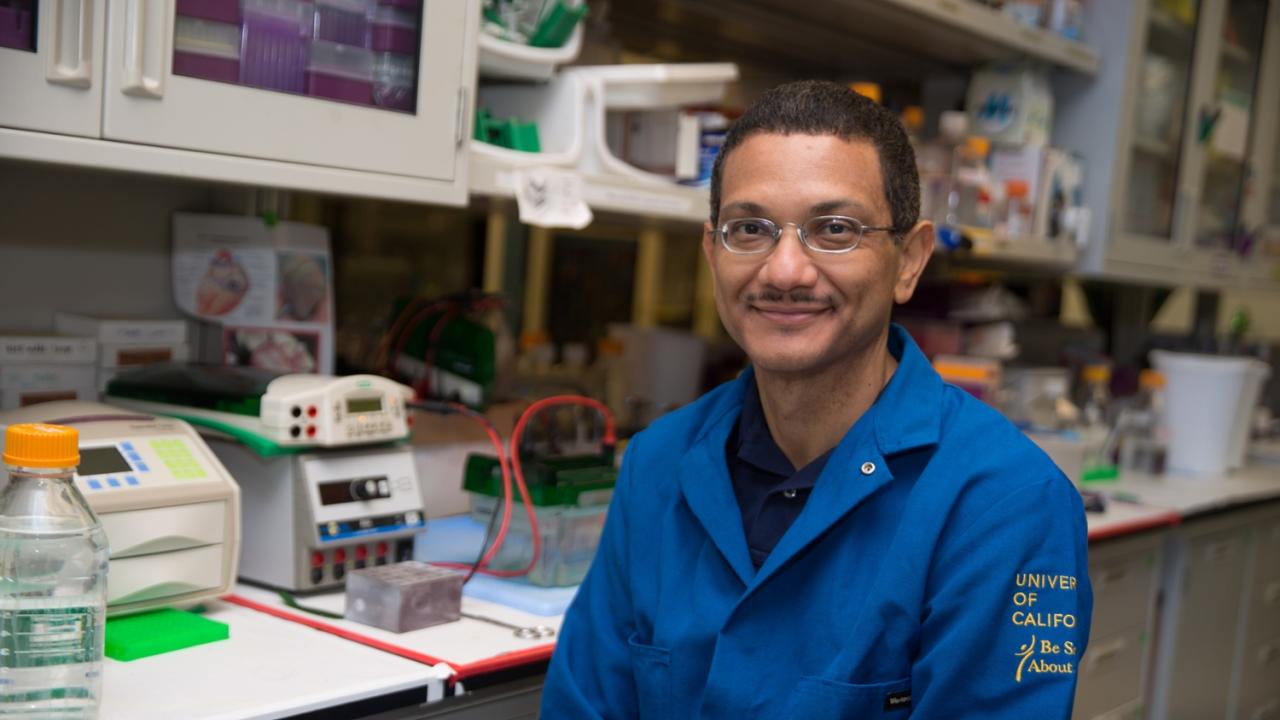
Connecting the Molecular Dots of Heart Disease
The most common genetic heart disease is also a silent one. Hypertrophic cardiomyopathy (HCM) affects one in 500 adults, and with few symptoms, it usually goes unnoticed. According to the American Heart Association, the disease is a common cause of sudden cardiac arrest among young adults.
Associate Professor Aldrin Gomes, Department of Neurobiology, Physiology and Behavior in the College of Biological Sciences at UC Davis, studies the underpinnings of heart disease, focusing on the machinery within heart cells responsible for producing the heartbeat. Along with colleagues in the Gomes Lab, he’s searching for molecular clues that will help medical professionals better manage heart disease.
“Heart disease is still the number one killer around the world,” said Gomes, who holds a joint appointment with the UC Davis Health Department of Physiology and Membrane Biology. “How can we reduce the number of people that die from heart disease? A lot of us have family members with some heart disease.”
Probing the proteasome
A symphony of biochemical processes maintains proper function within a healthy heart. Gomes focuses on the proteasome, a system responsible for the removal of cellular proteins.
The proteasome works like a miniature paper shredder, breaking down and recycling proteins no longer needed in the cells. When it malfunctions, damaged proteins build up in heart tissue over time.
Proteasome dysfunction is linked to many diseases, including age-related conditions like Parkinson’s and Alzheimer’s disease, but it’s also connected to HCM. Reducing proteasome activity in animals such as pigs causes cardiomyopathy and eventually heart failure.
Clues in the heartbeat
To investigate the genetic mutations responsible for HCM, Gomes focuses on troponin, a complex of proteins involved in regulating the heart’s contractions. In research published in Molecular and Cellular Proteomics, Gomes found a correlation between sudden cardiac death in humans and the severity of proteasome dysfunction in mice.
Troponin in HCM patients typically has a high calcium affinity, which prevents full relaxation of the heart muscles after contraction, according to Gomes.

When certain mutant troponins associated with HCM are introduced into heart cells, calcium levels are altered differently from normal troponin, causing proteasome dysfunction in both animals and humans.
Gomes has observed this dysfunction occur in mouse models within minutes after the introduction of mutant troponin into to the system.
“We hypothesize that this calcium imbalance is causing multiple signaling pathways, including the ubiquitin-proteasome system, to be affected, which leads to irregular heartbeats and ultimately increased the risk of cardiac arrest,” said Gomes. More details can be found in the Journal of Physiology.
To provide potential treatments for individuals with active lifestyles, Gomes and his colleagues are working to connect the molecular dots of the HCM puzzle.
“For those who enjoy physical activity, there should be a way for them to exercise like everyone else,” Gomes said.
Gomes and his colleagues are further investigating the proteasome’s role in HCM in hopes of finding a way to mitigate the disease and perhaps even one day prevent it.
A pinch of vitamin C
Many factors impair proteasome functionality, from environmental toxins to prescribed medications. Non-steroidal anti-inflammatory drugs, or NSAIDs, like ibuprofen or naproxen, are known to increase the risk of heart disease. But why?
As reported in the Journal of Molecular and Cellular Cardiology, Gomes discovered that NSAIDs, much like hypertrophic cardiomyopathy, hinder the proteasome’s ability to degrade harmful proteins within heart cells.
Currently, Gomes and colleagues are exploring the efficacy of vitamin C, an antioxidant, to alleviate NSAID side effects. In a test tube, vitamin C mixed with ibuprofen has inhibited some of the drug’s negative effects on the proteasome.
“The catch is the amount of vitamin C needed is much less than the amount people usually take,” Gomes said. “High amounts of vitamin C in vitro actually causes cell death. Smaller amounts, much smaller amounts, actually cause the cell to be happier and grow faster.”
